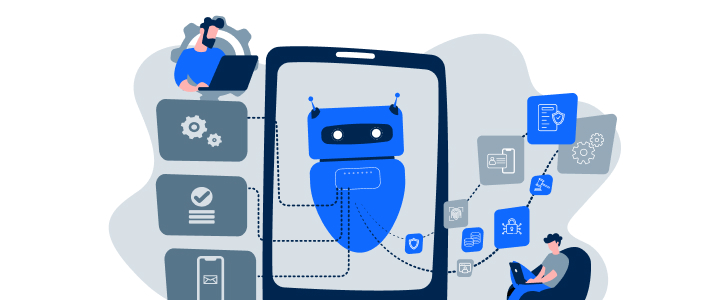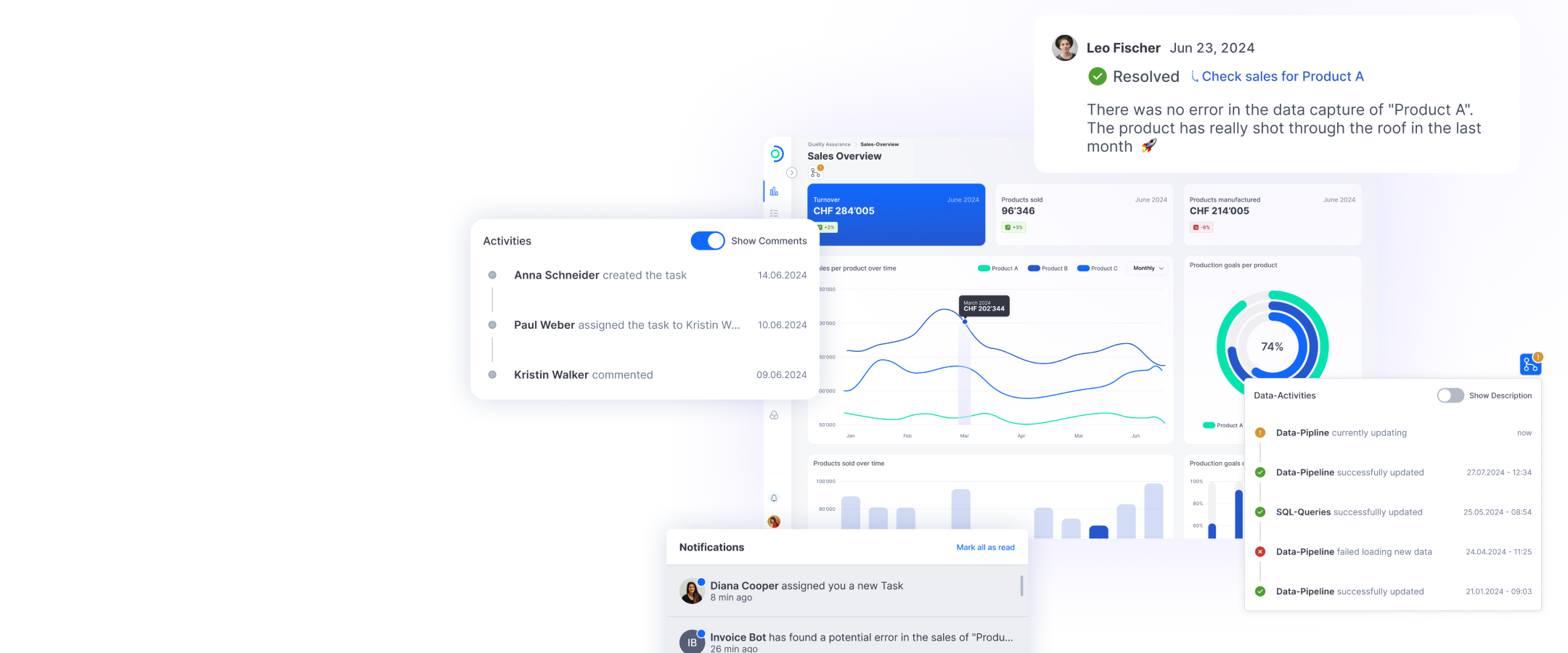“When it comes to creativity, ChatGPT outperforms humans by a long stretch”
At AlpineAI, you’re competing to offer a Swiss alternative to the dominance of the US and China. In your view, why does it matter where the technology is developed?
Search engines like Google or even large language models such as GPT are actually culture machines. They present completely different solutions depending who programs them. This is known as bias. Google shows different users different results or, for example, it answers certain political questions very differently than a Chinese search engine would. Because it’s all about values and culture, it’s important that we produce these technologies in Europe as well. We may be politically neutral here in Switzerland, but that doesn’t mean we’re culturally neutral. We need to understand these technologies. And ultimately, it’s also about Switzerland being a hub for research and innovation.
But how can Switzerland be taken seriously as a competitor to companies like OpenAI?
Just take a look at who developed these large language models, who was there right at the start. The founders of Deep-Mind were doctoral students in Lugano, and the well-known large language model Falcon has its roots in Switzerland. OpenAI also employed dozens of experts who completed their university education in Switzerland, but were rarely named due to NDAs. There’s a sense that something like this is a matter reserved for Silicon Valley. But actually lots of labs across the world contributed, including many in Europe. We can prove that Switzerland is an AI nation using the journal impact factor: Swiss publications in the fields of neuroscience, robotics and AI have an extremely high number of citations. It’s also no coincidence that major tech companies like Alphabet (Google), Meta (Facebook), IBM, Disney, and more recently Boston Dynamics, all have subsidiaries in Zurich. They benefit from the talent and research at our universities and use this to develop their products. So it can seem like they came from the US or China. We should be much more active in exploiting this position and evendeveloping technologies in Switzerland. As president of the Swiss Artificial Intelligence Awards, I know we have the expertise to do so. But the question is — do we want to?
“We should avoid trying to impose some set of rules on AI-ethics at a global level”– Pascal Kaufmann
Which ethical issues do you see as relevant when using and adapting AI?
Ethics is a difficult issue, there’s no global common denominator. Many studies show that ethical concerns are addressed completely differently depending on the cultural area. So ‘AI ethics’ is too general a term. We don’t even have universally agreed human rights that are accepted across the globe. Until we find answers to many more fundamental questions, such as how we live alongside each other or how we protect the global environment, we should avoid trying to impose some set of rules on AI ethics at a global level. Here’s an example of the bias I mentioned earlier — an effective search engine should be designed in a way that means it doesn’t just show old white men when it’s asked for examples of CEOs. But when we eliminate biases, we also lose lots of interesting aspects, because a bias always reflects a culture and a concept of humanity. Humans have preconceptions and opinions, and that’s a good thing. If you removed these from large language models completely, you’d have quite an unrealistic system. For me, it’s also ethical if Switzerland or Europe wins the AI race. When a country run by a dictator builds AI, it’s for an autocratic form of government with values that aren’t right for us. So we shouldn’t strive to be the world leaders in defining regulations, but we should be front and center, actively shaping the direction of AI development and creating innovations.
What motivated you to bring a Swiss version of ChatGPT to the market?
A key technology like this shouldn’t simply be left to the US or China, as both countries have ideas that we reject here in Switzerland. We need to understand the technology from here in Europe, from Switzerland. On December 15, 2022, so a few weeks after ChatGPT was released, we held a meeting with 20 leading European AI researchers at the Swiss AI Dinner. I was keen to hear what they thought about ChatGPT. At that point we weren’t sure whether it was all just hype, although we were all astounded by the rapidly rising user numbers. The group’s consensus was that on a purely technological level, ChatGPT wasn’t a revolution, but its usability and user interface were revolutionary. After a short discussion at thatmeal on December 15, 2022, we decided that we needed to build SwissGPT out of Switzerland. Once we founded the company, we held a press conference at the end of August 2023 at Zurich Airport, which attracted a lot of attention. Since then we’ve heard from more than 600 companies that want to introduce SwissGPT. Often laws prohibit the use of US systems, especially in the context of data relating to public administration. This is a market for SwissGPT which OpenAI can’t easily occupy.
What are your main USPs? What sets Falcon, the language model SwissGPT is based on, apart from the competition?
AlpineAI is LLM-agnostic and independent. That means we’re flexible and can use various large language models. If a better model goes live tomorrow and we can interpret the source code, we’ll integrate this model into SwissGPT as well. Though for us to use large language models, they have to meet a lot of criteria, such as the guidelines of the EU AI Act. We need to be able to know exactly how they’re trained. A reference point for this is Stanford’s analysis in July 2023, which compared lots of large language models across the world. The second version of Falcon in particular performs well today, which is why we focused on this model. We’re now using lots of other models, though Falcon comes out on top and is often sufficient for most Swiss needs. The unique thing about AlpineAI is that we work together with lots of Swiss AI labs. This type of collaboration is rare in this industry. What sets us apart from the competition is our vision, which goes beyond a large language model. We want to build an assistant that will enable us to work very few hours per week. The other 40 to 80 hours will be done by the assistant. We’re expecting huge productivity gains. And piloting new algorithms together with cutting-edge local research here in Switzerland is extremely interesting.
What are the next steps in developing SwissGPT? Will SwissGPT only be available to corporate clients?
We’re collaborating with large workspace providers with the aim of giving access to SwissGPT to all members of these workspaces. We’re also making SwissGPT available to key institutions such as research laboratories as well as communes and cantons. These initiatives go beyond exclusive use by companies. We don’t intend to offer SwissGPT to individuals. A reliable infrastructure is important so that companies and institutions can trust this technology. Our servers are at our site in Zurich, and may be in Davos in future as well. Since we’re not reliant on a single large language model, our solution can run uninterrupted if one fails. This makes SwissGPT a highly secure and reliable alternative. We’re also making our solution available for use in cuttingedge research, which we expect will lead to interesting developments that we can then, in turn, use for our product roadmap
How good do you think ChatGPT actually is? What surprised you, what are its weaknesses?
I was incredibly impressed by ChatGPT. I asked it a few questions which I knew the answer to — or at least I thought I did. About Nietzsche and the Ancient Greeks, for example. I also asked who would win if the Hulk, the Terminator and an alien teamed up in a battle against Superman, Iron Man and Batman. ChatGPT analyzed the strengths and skills of each team andmade predictions that a human couldn’tmatch. I also asked five people and ChatGPT the same creative questions, and compared their answers — ChatGPT outperformed the human team by a long stretch. ChatGPT generated almost 100 solutions, which far exceeded the few solutions that the humans came up with in half an hour, at least in terms of quantity. To some extent, it surpassed their solutions in terms of quality, too. Its ability to summarize and combine texts is incredible. What doesn’t work reliably, though, is retrieving factual knowledge and answering questions relating to numbers. This also applies to research questions with unknown answers — ChatGPT simply makes up an answer. A serious weakness that’s not so easy to fix. Other weak points are the huge energy consumption and inefficient algorithms, which both need improving.
“The significance of large language models like GPT cannot be overstated. For me it’s comparable with the invention of the printing press”– Pascal Kaufmann
ChatGPT launched a year ago now. What has happened in this time? Is the hype still there?
I see the current developments as a new chapter in human history. The significance of large language models like GPT cannot be overstated. For me it’s comparable to the invention of the printing press. Large language models accelerate human communication and take us to a whole new level. In my view, the introduction of ChatGPT has changed a lot of things. I’m expecting to see a clear acceleration in large language models, particularly in cutting-edge research. They’ll be able to communicate with each other and combine complex topics in new ways.
Many companies have jumped on the latest developments and started using ChatGPT to offer AI assistants linked to their company data. Does it surprise you that ChatGPT has been brought into productive environments so quickly?
There aren’t yet all that many business models or company solutions that use large language models productively, since it’s such a recent development. We’re still in the trial and error phase. Lots of legal questions haven’t yet been answered, and in some cases ChatGPT uses illegal content. There are a few lawsuits about it. Companies should consider which technology to use carefully because in some cases you can become implicated. In terms of critical knowledge in particular, I recommend treading carefully when it comes to promises from US providers. We also need to be careful about the language we use — lots of technological innovations are referred to as AI, but they’re impressive automations at best. We probably need to wait another few months before we see any really interesting and measurable business cases.
What’s changed in the world of AI since the launch of ChatGPT? Have you seen a new drive in developments or more interest from students?
A lot of researchers were amazed by how easily human language and the ability to engage in dialog can be recreated using relatively simple statistical laws and rules. You’d think intelligence, something like a consciousness, would be needed to hold a conversation of any real length. But apparently pure statistics are all it takes. This realization was astounding and will hugely accelerate AI research. Thanks to ChatGPT, the global online community has been able to experience the first forerunner of AI. The level of interest is massive, it will draw lots of young people into this field and we’ll see a new generation of researchers.







